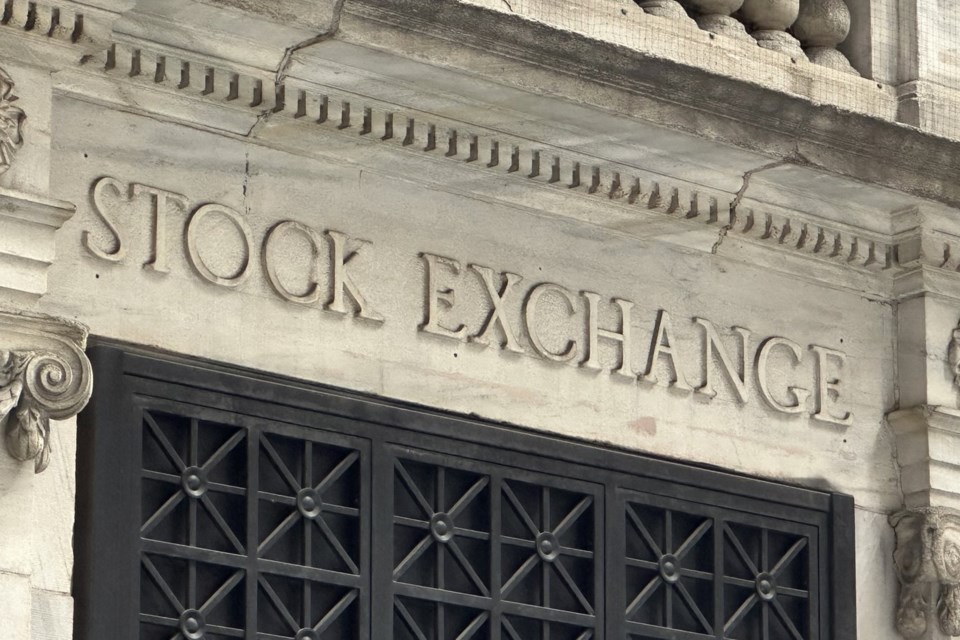NEW YORK (AP) — U.S. stocks drifted to a quiet close of the week, as Nvidia’s stock continued to cool from its startling, supernova run. The S&P 500 slipped 0.2% Friday, though it’s still near the all-time high it set on Tuesday. The Dow Jones Industrial Average edged up less than 0.1%, and the Nasdaq composite slipped 0.2%. Nvidia dragged on the market again with a loss of 3.2% and marked its first losing week in the last nine. Treasury yields held relatively steady after a preliminary report suggested U.S. business activity is stronger than expected while pressure on inflation remains muted.
THIS IS A BREAKING NEWS UPDATE. AP’s earlier story follows below.
NEW YORK (AP) — U.S. stocks are drifting toward a quiet close of the week on Friday, as Nvidia 's stock continues to cool from its startling, supernova run.
The S&P 500 was 0.1% lower in afternoon trading, though it’s still near its all-time high set on Tuesday. The Dow Jones Industrial Average was up 5 points, or less than 0.1%, as of 1:12 p.m. Eastern time, and the Nasdaq composite was also nearly unchanged.
Nvidia again was dragging on the market after falling 2.3%. The company’s stock has soared more than 1,000% since October 2022 on frenzied demand for its chips, which are powering much of the world’s move into artificial-intelligence technology, and it briefly supplanted Microsoft this week as the most valuable company on Wall Street.
But nothing goes up forever, and Nvidia’s drops the last two days have put its stock on track for its first losing week in the last nine.
Much of the rest of Wall Street was relatively quiet, outside a few outliers.
Sarepta Therapeutics jumped 32.3% after U.S. regulators approved the use of its medicine for children with Duchenne muscular dystrophy who are at least 4.
CarMax rose 0.4% after delivering profit for the latest quarter that edged past analysts' expectations.
Gun maker Smith & Wesson Brands tumbled 11.6% despite reporting stronger profit for the latest quarter than analysts expected. The summer is traditionally a slower season for firearms, according to CEO Mark Smith.
Shares of Trump Media & Technology Group slumped 6% to bring its loss for the week to 32.2%. The company behind Donald Trump's Truth Social platform has seen its stock roughly halve since the conviction of the former president in late May on charges in a scheme to illegally influence the 2016 election through a hush money payment to a porn actor who said the two had sex.
Trading on Wall Street could yield many shifts during the day, with wide swaths of futures and options contracts to buy stocks and other types of investments set to expire.
In the bond market, U.S. Treasury yields initially fell after a report suggested business activity among countries that use the euro currency is weaker than economists expected. Concerns are already high for the continent ahead of a French election that could further rattle financial markets.
The weak business-activity reports dragged down yields in Europe, which at first pressured Treasury yields. But U.S. yields recovered much of those losses after a separate, later report said U.S. business activity may be stronger than thought.
Overall output growth hit a 26-month high, according to S&P Global's preliminary reading of activity among U.S. manufacturing and services businesses. Perhaps more importantly for Wall Street, that strength may be happening without a concurrent rise in pressure on inflation.
"Historical comparisons indicate that the latest decline brings the survey’s price gauge into line with the Fed’s 2% inflation target,” according to Chris Williamson, chief business economist at S&P Global Market Intelligence.
The Federal Reserve is in a precarious spot, where it's trying to slow the economy through high interest rates by just enough to get high inflation back down to 2%. The trick is that it wants to cut interest rates at the exact right time. If it waits too long, the economy's slowdown could careen into a recession. If it's too early, inflation could reaccelerate.
Hope still reigns among traders that the Fed can pull it off, and many are forecasting at least two cuts to interest rates later this year, according to data from CME Group. Of course, their predictions have regularly proven to be overly optimistic through history.
Fed officials themselves have penciled in one or two cuts in 2024 to their main interest rate, which has been sitting at its highest level in more than two decades. The economy is still growing, though it has slowed under the weight of high rates. Housing and manufacturing have been hurt, while lower-income households are struggling to keep up with still-rising prices.
The yield on the 10-year Treasury was holding steady at 4.26%. The yield on the two-year Treasury was also unchanged at 4.74%.
In stock markets abroad, European stocks fell after the weak continental economic reports, and many Asian indexes were also lower. Hong Kong’s Hang Seng dropped 1.7%, and South Korea’s Kospi fell 0.8%.
___
AP Business Writers Yuri Kageyama and Alex Veiga contributed.
Stan Choe, The Associated Press




